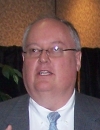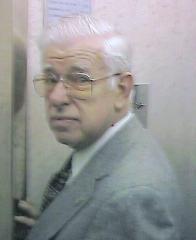Next Meeting - April 3 - This is the age of specialization, nowhere more apparent than in the field of medicine, both human and animal. GALE STIRR is the Program Host, and she will introduce Dr. Richard Dubielzig, professor and veterinary pathologist at the UW Veterinary School, and a member of the Eye Institute. Great strides are being made in veterinary medicine, just as we have seen in humans, and Dr. Dubielski is studying the cancers which occur after eye injury to cats. The medical discoveries in people and animals transfer back and forth - for example, it is now possible to do cataract removal and lens implants in dogs, and the research done on animals helps the progress in human eye care. The Institutes at UW are created to foster the exchange of information between specialists in different fields, and we will hear a lot more about it.
At our last meeting, Pres. JIM opened the meeting, and also led the song. MICHELLE VETTERKIND gave the invocation, and the editor’s new adopted family member Pepper made history as the first dog to be included in a MCLC invocation. DALE MUELLER’s wife Gwen was with us as a guest.
Flower Sale flyers were handed out, and are available along with order blanks from Pres. JIM. The depot will again be in the Edgewater lobby.
A grateful “Thank You” letter, from the recipient of a cataract operation which our Club funded, was read. This is another translation of what it means to be a Lion - “because of what I do today, someone will see tomorrow.” The Club has fulfilled the purpose of a large financial bequest which we received some years ago from a person not previously known to us “for eye surgery outside of UW Hospital.” (The UW got a separate bequest for their hospital.) We have added to those funds over the years and they have now brought back sight to someone who was losing it. Not all cataract patients are old enough to be covered by Medicare, as your editor can attest.
Sec. JOHN JENSON reported that we had 7 members attending the District Convention, and the new District Governor-elect is Lion DARYL PORTER.
SCOTT GROVER noted that the East Club has a highway cleanup project (on April 14) and a Vision Screening scheduled (on May 11). MCLC members are welcome, and needed, to assist. See SCOTT.
MICHELLE VETTERKIND introduced our speaker, Neil Heinen of Channel 3 and Madison Magazine. Your editor noted the typical TV anchor attire - shirt, tie and sport coat above, and blue jeans below camera level. Unlike some TV anchors, though, Mr. Heinen is a good speaker without a teleprompter, and his wide-ranging talk covered everything from his start in radio with voices from the distant past like Bob King, Bob Banquo and Jim Mader, to a recent stint as national Pres. of the Editorial Writers Assoc., where he was one of 10 TV editorialists among 500 print media people. He spoke of the changing nature of news - smartphones put pictures and text on the internet as the event is happening - it isn’t held for the 6 o’clock news. It was a time when newspapers were collapsing, and TV also shrank as the recession brought reductions in income. The internet is almost instantaneous, so to some extent TV has replaced newspapers as an “in depth” source of information. (Your editor finds this frightening, given that most TV items are covered in a matter of seconds.)
In a massive understatement, he said “There is a lot of political energy in the state right now!” He also commented that community service organizations are still there, despite the societal changes.
He spoke briefly of Madison Magazine, noting that there is still a niche for local and regional magazines, and said that Brennan Nardie was doing a great job as editor in difficult financial times.
Channel 3 in Madison is locally owned, and started editorials as a voice about issues in 1992, twenty years ago. Each year they select issues for editorial attention - this year they are racial disparity in education, jobs and the workforce, children’s issues, and the nonprofit community, which he characterized as generous people working to make things better. He noted that on many of the current controversies “it is the edges making the noise,” something your editor also believes. He also noted that TV hires a lot of journalism school graduates, which should produce reporters who know how to do it properly. In many cases, politicians make the conflict the news story, not the issues. Your editor would note that the simple act of taking a stand on any issue instantly produces friends and foes, and whatever you think of the position they take, you have to give them credit for being willing to take the heat and show up again the next day. A very interesting talk.

